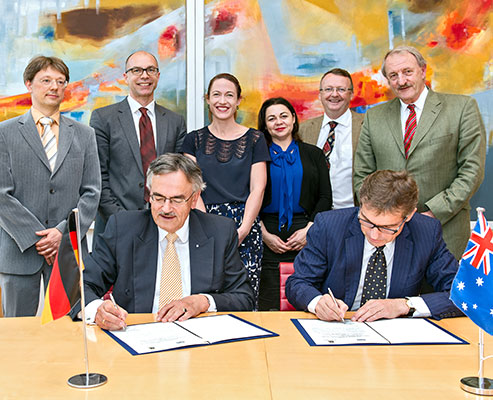
A thriving manufacturing sector and emerging dominance in the advancement of information technology, biotechnology and renewable energy sectors have placed Germany firmly at the forefront of UQ’s global strategy.
Germany, the largest single European economy and fourth largest worldwide, is a global leader in research, innovation, science and technology. It maintains this position by spending close to three per cent of its gross domestic product on research and development annually.
As such, Germany has been a significant research partner for UQ for several decades. UQ has established relationships with 19 universities and two research institutes in Germany, including global top 100 universities Ludwig-Maximilians University of Munich (LMU), Technical University of Munich (TUM) and Humboldt University of Berlin. These partnerships have led to significant student mobility, academic collaborations and research discoveries.
Close alliances have also been formed with the German Research Foundation (DFG), the German Academic Exchange Service (DAAD), the Alexander von Humboldt Foundation, the Max Planck Society and the Helmholtz Association of German Research Centres.
In addition, UQ has partnered with a number of German companies for joint research and funding, including Siemens, Boehringer Ingelheim International, Bayer HealthCare and Bruker BioSpin MRI.
Three UQ alumni have also been appointed as Australian Ambassadors to Germany during the past decade, including David Ritchie AO (Bachelor of Arts (Hons) ’75), who in 2014 replaced Peter Tesch (Bachelor of Arts (Hons) ’87), and Ian Kemish AM (Bachelor of Arts (Hons) ’87).
Deputy Vice-Chancellor (International) Professor Monique Skidmore said German institutions had a history of cooperating closely with industry partners.
“These partnerships have enabled them to transfer knowledge from research endeavours to inventive products and services for the benefit of society,” she said.
TUM is one such institution that has very close links with industry, signing around 1000 co-operation agreements every year. Some of TUM’s long- standing partnerships include global giants Siemens, General Electric, BMW and Audi.
In June, UQ expanded its collaboration with TUM through a jointly organised research symposium on the topic of “Water, Environment and Sustainability”. The symposium provided researchers from both universities the opportunity to share their knowledge and perspectives, and discuss collaborative approaches to pressing global challenges.
An important feature of the symposium was the presence of some of TUM’s industry partners, who provided valuable insights for UQ researchers.
“Partnering with German institutions such as TUM provides UQ with expanded opportunities to engage with leading global companies in Germany and forms a key foundation in achieving our vision to create knowledge leadership for a better world,” Skidmore said.
UQ and TUM are both world leaders in research into life sciences and physical sciences, as evidenced by the top 100 rankings for both organisations in those disciplines in the Academic Ranking of World Universities and Times Higher Education World University Rankings.
“These high rankings provide an excellent platform for our research teams to submit joint proposals for funding to expand our collaborative research and deliver greater global impact,” Skidmore said.
Another important research collaboration is the partnership between the Queensland Brain Institute (QBI) and the Munich Centre for Neurosciences (MCN), which has been in place since 2010. The MCN is a virtual centre in which several faculties of LMU and other Munich-based research centres participate to enable integrated, interdisciplinary neuroscience.
Director of QBI Professor Pankaj Sah said the QBI- MCN agreement provided opportunities for collaborative research and teaching programs, as well as staff and student exchanges.
“So far we have held three symposia together, two at UQ and one at LMU. In addition, we organised an Autumn School and Workshop in Human Cognitive Neuroscience at UQ in 2014 and had staff and students visiting each others’ labs over the past five years,” he said.
“The long-term goal is shared expertise, to learn from each others’ experiences and to mutually benefit and prosper from the relationship.”
While the relationship is still quite young, Professor Sah said QBI and MCN aimed to increase the number and quality of co-publications and in time build a critical mass which would allow both to jointly apply for grant funding for major research projects.
Targeting Chronic Pain
A significant research collaboration between UQ and German pharmaceutical company Boehringer Ingelheim International is seeking new ways to target chronic pain, with the potential to bring relief to millions of sufferers around the world.
Professor Maree Smith from UQ’s Centre for Integrated Preclinical Drug Development is leading a three-year project that ultimately seeks to help develop new painkillers that are highly effective, without the unpleasant side effects.
Top 20 global pharmaceutical giant Boehringer Ingelheim International contributed $1.5 million towards the project in 2012, which also attracted a $1.575 million Australian Research Linkage Project Grant. Smith said chronic pain was an area of large unmet medical need.
“Chronic pain affects one in five adults in Australia and other countries globally,” she said.
“Currently available analgesic drug treatments are often poorly effective and/or they produce unpleasant side effects.
“Unfortunately in the past two decades, most new molecules that have been tested in patients with chronic pain did not produce pain relief, despite these same compounds showing promising analgesia in rodent pain models.
“The overarching goal of my large ARC Linkage grant-funded research project in collaboration with Boehringer Ingelheim has been to bring innovation into the methods used to assess the analgesic properties of new molecules produced by drug discovery researchers.”
Welcoming Future Global Leaders
Germany is home to UQ’s eighth largest cohort of international alumni, and this figure will continue to grow as UQ becomes an increasingly popular student exchange destination.
One program helping to boost these numbers is the German Global Leaders Scholarship, which provides German students who excel academically with the opportunity to undertake postgraduate study at UQ in the areas of business, economics and law.
Master of Business student Anna Brandt, a German Global Leaders Scholarship recipient, is currently on exchange from Hamburg. She said she was enjoying studying at St Lucia campus.
“I really love the St Lucia campus and all it has to offer – nice places to meet people and socialise, great libraries with quiet study spaces that are open 24/7, great outdoor space and a lot of student services, from career advice to academic workshops and language courses,” she said.
Brandt said diversity was another advantage of studying at UQ.
“Although I have studied an international degree in my undergraduate studies and have spent some time abroad, it has not been as diverse as UQ,” she said.
“It is very enriching to study and work with so many people from completely different cultural backgrounds and I think that this experience has changed my view, the way I work with people and has opened new perspectives.”
To complement her studies, Brandt is completing an internship at UK Trade and Investment, which is based at the British Consulate in Brisbane and supports Australian companies starting businesses and investing in the UK.
“The internship is giving me very interesting insights on the business relationships between the UK and Australia, especially Queensland,” she said.
“It is great to get these experiences and learn more about this field.
“The career team from the BEL faculty helped me to get this internship position and supported me throughout the application process.”
Brandt said she highly recommended UQ and Brisbane as a study destination.
“My advice for students from Germany: do it. It’s an excellent university and a great place to live!”
To find out more about the German Global Leaders Scholarship, visit bel.uq.edu.au/uqdeutschlandscholarship
This story originally appeared in the Summer 2016 edition of Contact Magazine.



